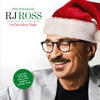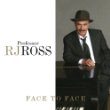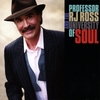Professor RJ Ross
Professor RJ Ross
Official Biography (courtesy of Professor RJ Ross)
"Professor RJ Ross and The University of Soul" is the first solo album by singer, songwriter and pianist RJ Ross, but a lifetime of music went into its production.
Ross has been playing piano, singing, writing and arranging since he was an eleven year-old prodigy in Detroit. He was a founding member of the legendary Detroit funk band Brainstorm and played on their celebrated album, "Stormin'". "This Must Be Heaven," a Ross original by Brainstorm, continues to get airplay around the world today.
As a Midi expert and in-house keyboard player for the world-famous Fantasy Studios, he worked with Jeffrey Osborne, Eddie Money, MC Hammer and many others.
Now Ross steps into the spotlight with this debut album of classic R&B and smooth jazz. The album's ten originals showcase Ross's extraordinary songwriting skills, sharp piano work, inventive arrangements and mellow, soulful vocal style. While hints of the great soul singers of the past inform Ross's performance, his husky, resonant tenor is all his own, a unique instrument instantly recognizable for its warm, playful quality.
The tracks for "Professor RJ Ross and The University of Soul" were recorded at Capitol Studios in Hollywood with legendary recording engineer, Al Schmitt (Diana Krall, Ray Charles) at the controls. The University of Soul's faculty includes some of the nation's top musicians and singers: producer/guitarist Jerry Stucker (Paul Jackson, Holland-Dozier-Holland); drummer James Gadson (Donald Fagen, Marvin Gaye); bass man Freddie Washington (Simon & Garfunkle, Michael Jackson); B3 organist Neil Larsen (Aaron Neville, Al Jarreau, Larsen-Feiten band); tenor and soprano sax player Ernie Watts (Charlie Haden, Rolling Stones) and backing vocalists Sandy Griffith (Whitney Houston, Elton John, Boz Scaggs, the Rent soundtrack) and Jeannie Tracy (Two Tons of Fun, Weather Girls, Aretha Franklin). Grammy-award winner, Ed Cherney, mixed the album at The Village in Los Angeles.
Ross strikes a universal chord with original tunes that are by turns jaunty, funky, moody, romantic and ironically humorous. The lead off track, "Face to Face" is a funky mid-tempo blues, that brings to mind Mose Allison as
produced by Philadelphia's Gamble and Huff. Larson's big Hammond B3 and Ross's electric piano dance around Stucker's bedrock guitar rhythms. Watts lays out a vibrant sax solo as Ross's vocals communicate the tongue in cheek wisdom of a street corner philosopher. "The Outsider" is a minor key blues with a Gospel feel that's complimented by the sanctified vocals of Griffith and Tracy. Ross turns in a moody vocal that slips from his trademark rumble to an almost heartbreaking falsetto.
"Wishing," possibly the album's most beautiful love song, has an intricate, instantly memorable melody. Ross plays with his high end, delivering a vocal that recalls classic soul men like Smokey Robinson and Curtis Mayfield. Ross, Griffith and Tracy end the tune with pleading, late night harmonies that bring even more longing to the song's aching feel. Watts adds a brief solo and Ross plays piano with subtle country blues accents. "I'm On My Way" is a jaunty song with a soulful, 60s texture. It's a rootsy, bouncy celebration of life's simple joys, with playful piano work by Ross that augments the tune's jolly aura while his vocal exudes a giddy joie de vivre.
The one cover, a Ross arrangement of the old favorite "Autumn Leaves", includes a newly composed bridge that intensifies the song's aching melancholy. On his piano solo, Ross manages to convey the bleak, sparse sense of loss and approaching winter. The backing vocalists whisper "Please come back to me" as the song fades, adding a bit of hope to a song about regret and abandonment.
The diverse palette of "Professor RJ Ross and The University of Soul" will appeal to lovers of classic pop and R&B, smooth jazz, blues, contemporary jazz and Adult Contemporary. In his songwriting and arranging, Ross has a cosmopolitan approach and never talks down to his audience, trusting in their musical sophistication and ability to enjoy his grown up, somewhat detached take on life and love as well as his remarkable musicianship.
RJ Ross grew up in Detroit surrounded by the sounds that would influence him all his life: Soul, R&B and Motown - especially Stevie Wonder, Ray Charles, Smokey Robinson, Marvin Gaye, Gladys Knight and Aretha Franklin. "My older brother brought home doo wop 45s, and records by Elvis, Little Richard and the rest of the early black artists," Ross recalls.
He started his musical career playing trumpet in the grammar school band and was leading his own dance band by the time he was eleven. "When I was nine, someone came to the class with pictures of band instruments. I liked the trumpet's looks and ended up studying privately for years, but as soon as I picked up the trumpet, I could play and entertain the other kids. I was playing a jazzy version of the folk song 'Erie Canal' in the hall shortly after I got my trumpet. The music teacher dragged me down to the band room and when the kids heard me, they went wild! It was my first taste of how much fun it is to entertain an audience."
"My older brother had a popular dance band and I emulated everything he did. When I was eleven, I started a band and we worked continually. Later on we added guitars to the line up of piano, drums bass and me on trumpet. We did parties and weddings. For the grownups I'd play trumpet on songs like ‘Days of Wine and Roses' and classic ballads; for the kids I'd sing and play tambourine on Chuck Berry, Little Richard and Ray Charles tunes." Ross was also the MC and booked the jobs and paid the musicians.
At 16 Ross wrote and sang lead on "You're the Love" with his band The Sixpence. The band name was a nod to the British invasion, but they were playing their own version of Motown. When Ross took the demo to Impact Records, the band got signed. "You're the Love" got airplay in a few markets and a bubbling under the top 100 notice in Billboard.
After studying music at Wayne State, Ross helped form the legendary Detroit funk band Brainstorm. Their song, "Lovin' Is Really My Game" rose to #3 on the Billboard Dance Charts and #14 on the R&B Charts, receiving an award from Billboard as best song of the year in the "light airplay" category. "This Must Be Heaven", a Ross original, became a radio hit. It continues to get airplay around the world and is considered a soul classic. It recently appeared on a compilation called Soul Classics, Vol. 2 on Collectables Records. Ross joined the band as keyboard player, but inspired his bandmates with his desire for a professional regimen of rehearsals. They were soon the top band in the Detroit area and released an album, Stormin', on the Tabu label.
After leaving Brainstorm, Ross moved to the San Francisco Bay Area. He played in local bands and became the in-house keyboardist and Midi expert at the world-famous Fantasy Studios. While he was there he worked as an arranger, producer, songwriter and studio musician. He contributed to recordings by Jeffrey Osborne, Eddie Money, MC Hammer and the Swedish rock group Europe.
He left Fantasy to found RJ Ross Productions where he continued doing production, arranging, composing and keyboard work for a variety of artists, including soon to be superstar, Tupac Shakur.
Eighteen months ago, after a long career of writing and arranging for others, Ross started work on his solo debut with producer Jerry Stucker, another Bay Area maverick known for his masterful fretwork and studio expertise. They went
into Capitol Studios and "Professor R J Ross and The University of Soul" is the satisfying result of their labors. The Professor is releasing it initially on his own label, Lantana Records, while national distribution is being negotiated. He'll also be supporting the CD with solo gigs in the Bay Area while he rehearses a band for a national tour, including Jazz and Blues festivals here and abroad.
A lifetime in the music business has given Professor RJ Ross a passionate authority that is evident in every note he plays and every syllable he sings. His powerful song writing, unique piano style, and distinctive vocal approach mark him as a seasoned Jazz / Soul artist of depth, in the great tradition of Detroit and New Orleans Piano Men. This is the real deal - an old school Soul Man with a joyful, uplifting message that's a testament to his resolute spirit and innate musical sense.
Reviews
| Song of the Month - Darnell Kendricks - "What a Wonderful Night" |
| Choice Cut - Christian de Mesones feat. Nes Powers - "Stay" |
| Video of the Month - Helen Bruner and Terry Jones - "You Got Me Feeling" |
| Listen Now! - The Fresh Soul Playlist |



